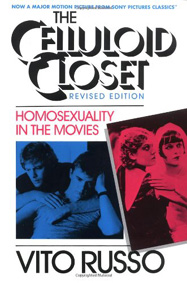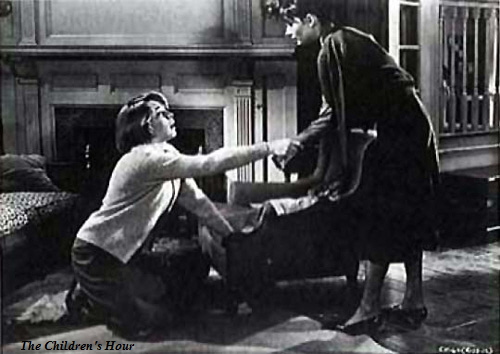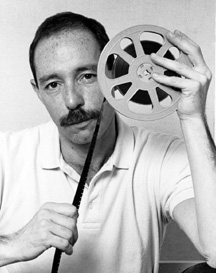|
In the afterword of the 1987 revised edition of The Celluloid Closet: Homosexuality in the Movies, published three years before his death in November 1990, Vito Russo wrote, "It has become clear since the first edition of this book was published that what we need is no more films about homosexuality."
Of course, as Russo went on to explain, what he meant was that no one needed any more movies explaining homosexuality to mainstream audiences. "I'm tired of trying to figure out whether the latest well-meaning soap opera has succeeded in convincing America that I don't have horns and a tail," he wrote.
The first edition of The Celluloid Closet was published in 1981. At that
 time, as Russo chronicled, cinematic portrayals of LGBT people—if they were portrayed at all—were rife with mockery, condemnation, and ignorance. Russo quoted Time magazine using the phrase, "The Third Sex," to describe gays and lesbians as late as 1968. time, as Russo chronicled, cinematic portrayals of LGBT people—if they were portrayed at all—were rife with mockery, condemnation, and ignorance. Russo quoted Time magazine using the phrase, "The Third Sex," to describe gays and lesbians as late as 1968.
At that time, the reviews of revered critics such as Pauline Kael, Andrew Sarris and Bosley Crowther dripped with homophobia. The late Stuart Byron, film critic for The Village Voice in the 1970s, told of arguing with Kael about the films of Alfred Hitchcock, which Byron admired and Kael did not. Kael, Byron wrote, ended the conversation by smiling at Byron condescendingly and saying, "Of course. You're a Hitchcock queen."
From the "sissies" prevalent in silent films and early talkies (Edward Everett Horton, Franklin Pangborn and Grady Sutton were the most famous among them), the cinema progressed to gay villainy (Caged, Rope, A Walk on the Wild Side) or homosexuality as a social problem (Tea and Sympathy, The Children's Hour). The Celluloid Closet faithfully records that history.
 |
Some European films of the 1960s and 1970s, such as Victim, Sunday Bloody Sunday, and The L-Shaped Room, presented sympathetic portraits of gay or lesbian characters. Nevertheless, Russo found most films of the period that purported to be honest portrayals of homosexuality to be bland, condescending, insulting, or all three. Of The Boys in the Band, William Friedkin's 1970 film of Mart Crowley's play, he wrote, "(W)hile it was considered the pinnacle of Hollywood's commitment to the exploration of such 'adult' themes as homosexuality, it was in fact a freak show. The 1970s would continue to reflect the freak show of homosexual villains, fools and queens."
Writing in the revised edition, Russo found the films of the 1980s a mixed lot. He disapproved of such mainstream attempts to delineate gay life as Making Love ("a gay film for straight people") and Partners. Yet he found much to praise in independent and foreign films such as Prick Up Your Ears, Taxi zum Klo, My Beautiful Laundrette, and especially Parting Glances. "The genius of Parting Glances is that none of it is about being gay or even about how gay people live," Russo wrote. "The film revealed that movies can explore gay life without being about gay life…Parting Glances doesn't show how gays react to AIDS. It shows how Nick's friends react."
 |
The Celluloid Closet was the work of a man who was both a passionate film buff and a passionate advocate of gay rights. Celluloid Activist: The Life and Times of Vito Russo, Michael Schiavi's 2011 biography, is invaluable in placing Russo's life and work in context. (There is also Vito, Jeffrey Schwarz's 2012 TV biography first aired on HBO, which I have not seen.)
 In meticulous detail, Schiavi tells the story of a Sicilian-American kid born in Manhattan but raised in New Jersey, who never had any confusion about his sexual identity (two openly gay cousins helped), and who escaped to the revival theaters, bars and bathhouses of Greenwich Village as soon as he possibly could . Working in the film department at the Museum of Modern Art, he approached his boss, Willard Van Dyke, about the possibility of delivering a lecture about homosexuality on film. Van Dyke invited Russo to speak at a conference in New Hampshire. After the lecture, according to Schiavi, Van Duke told Russo, "You're interested in film and you're active in the gay rights movement. You should be the one to write the book on gay film." In meticulous detail, Schiavi tells the story of a Sicilian-American kid born in Manhattan but raised in New Jersey, who never had any confusion about his sexual identity (two openly gay cousins helped), and who escaped to the revival theaters, bars and bathhouses of Greenwich Village as soon as he possibly could . Working in the film department at the Museum of Modern Art, he approached his boss, Willard Van Dyke, about the possibility of delivering a lecture about homosexuality on film. Van Dyke invited Russo to speak at a conference in New Hampshire. After the lecture, according to Schiavi, Van Duke told Russo, "You're interested in film and you're active in the gay rights movement. You should be the one to write the book on gay film."
The Celluloid Closet grew out of a series of lectures Russo gave across the U.S. Schiavi records the struggles that Russo—who never made big money, and who at times had scarcely enough to live on—had in writing the book. He also tells of the help provided by Russo's friends. One was Arnie Kantrowitz, a college professor and gay activist who was Russo's closest friend. (Kantrowitz had planned to write Russo's biography, Schiavi writes, but when Schiavi announced his project Kantrowitz was unstinting in his time and generosity.) Another was Lily Tomlin, who invited Russo to stay in her Los Angeles house (owned previously by W.C. Fields) to work on the book. Tomlin later provided Russo with money when he was dying of AIDS and could no longer work; she also narrated Rob Epstein and Jeffrey Friedman's 1995 film of The Celluloid Closet. It is telling, however, that Tomlin (as Schiavi tells us) did not feel safe to come out officially until 2000.
 |
The Celluloid Closet has never been without detractors, even within the gay community. Some critics, Schiavi tells us, faulted Russo when the book was first published for leaving Eisenstein, Fassbinder, John Waters and others out of his discussion; others condemned his lack of interest in cinematic and social theory. "In fact, Vito tried not to read films in a social vacuum…But it is also true that he had no interest in interrogating the social or material foundations of homosexuality," Schiavi writes. "His own experience in desiring other men and encountering homophobia both onscreen and off convinced him of the political efficacy of his arguments."
One of Russo's early detractors, film historian Richard Dyer, later recanted his criticism of The Celluloid Closet and appeared as a commentator in Epstein and Friedman's film. Speaking to Schiavi, Dyer said The Celluloid Closet "hasn't been surpassed, really" despite the boom in gay-themed films in the three decades since its first publication.
"I think (Vito) laid down…the basic line of development and sets of concerns for Hollywood cinema," Schiavi quotes Dyer as saying. "(W)hat are we to think about camp figures, and sissy figures, and so on? What do we think about stereotypes? What do we think about all these deaths of lesbians and gay men in movies?" Schiavi adds, "Subsequent critics have answered Vito's questions in their own ways, but the questions themselves remain integral to film criticism."
The Celluloid Closet, for all its omissions, is still bracing and compulsive reading for anyone—not just any LGBT person—who cares anything about the cinema and how it reflects societal attitudes. Every page contains a fascinating and pertinent nugget of information. Russo tells us of Anders als die Anderen (Different from the Others), a pioneering 1919 German film starring Conrad Veidt as a gay concert violinist who responds to blackmail by committing suicide. (Suicide and violent death would be the universal fate of non-comic cinematic homosexuals for the next several decades.) Only one partial print of Anders als die Anderen, found in Ukraine, survives; the Nazis, always efficient in matters of destruction, burned every copy of the film they could find. "In Vienna one of them fired into the audience, wounding several patrons," Russo writes. (See Cover photo at the top of the page)
Some wrongs Russo recorded would be righted after his death, such as the excision of the "Snails and Oysters" scene between Laurence Olivier and Tony Curtis from Stanley Kubrick's Spartacus. When Robert Harris restored the film in 1991, he replaced the scene; the soundtrack was gone, so Harris had Curtis re-record his lines and brought in Anthony Hopkins as a voice double for Olivier, who died in 1989.
Some friends and fans of Russo found Epstein and Friedman's film hard to accept. "What about Vito's anger? For that matter, what about Vito himself?" Schiavi writes. "Many who remembered his lectures couldn't accept the idea of watching his clips without his voice to string them together."
However, reading the book and watching the movie in 2014, nearly a quarter-century after Russo's death, underlines the impressive achievement of both. Each informs the other; the book gives us details the film can't, and the film brings the book's central arguments to life. The montage of brutally homophobic images from Cruising, The Detective, and other films reminds us viscerally of why Russo was angry, and why he and so many thousands of others took to the streets.
The testimony of Russo's friends—Armistead Maupin, Harvey Fierstein, Jan Oxenberg and others—adds enormously to the impact of the film. The thread of their reminiscences is constant: in their youth, they searched desperately in movies for anything that mirrored their feelings, anything to keep them from feeling alone, and learned that people like them always ended in ostracism, infamy, and violent death. Meanwhile, in the Special Features section of the DVD, Kenneth Anger recalls the Hollywood Capital News, a right-wing rag that egged on the L.A.P.D. in its frequent raids of gay bars. "ARE QUEERS PEOPLE?" the Hollywood Capital News once editorialized, a headline Anger rightly characterizes as "Hitlerian."
So what has changed since Russo's death? We see more gays, lesbians and transgendered people, and in more positive ways, in movies today, even if some of the stories still end in death—Milk, Brokeback Mountain, Boys Don't Cry, A Single Man. There have been happy and positive films about LGBT people in recent years—Transamerica, Latter Days, The Kids are Alright—even if actual LGBT people might quarrel with various aspects of those films.
I find it difficult to speculate on how Russo would have reacted to the films that came after him which dealt with the disease that took his life and the lives of so many of his friends. It feels vaguely disrespectful, albeit inevitable, to even mention that. (Russo was a major figure in ACT UP, as well as in GLAAD and the Gay Activists Alliance.) If Russo saw Longtime Companion, which was released in the year of his death, Schiavi doesn't mention it. I think he would have preferred Longtime Companion to Philadelphia, which I personally have always found too glossy and antiseptic, despite the undeniably fine performance by Tom Hanks.
The film I think Russo really would have liked is Jean-Marc Vallee's Dallas Buyers Club. This is the true story of Ron Woodroof (Matthew McConaughey), a homophobic good old boy in 1985 Texas who finds himself diagnosed with full-blown AIDS, and who must unite with a transgendered prostitute named Rayon (Jared Leto) to obtain the drugs to keep them both alive. This, I think, is exactly the sort of film Russo hoped he would see someday. Woodroof and Rayon maintain their stubborn individuality, yet they find mutual respect and even friendship in the acknowledgment of their mutual mortality. One scene set in a supermarket—in which Woodroof and Rayon have a violent encounter with one of Woodroof's former cronies—is strikingly emblematic of Woodroof's moral growth, and more generally of the growth society has made since that time.
 |
It doesn't hurt that McConaughey and Leto give two of the most vivid, powerful performances of the past decade. (Unfortunately, Russo would also have recognized all too well the actions of the Reagan-era Food and Drug Administration, which was much more interested in preserving its bureaucracy than in saving the lives of gay men.)
The Special Features section of The Celluloid Closet includes archival footage of Russo, expressing the hope that gays and lesbians would continue to find acceptance in the cinema and elsewhere, although he added, "It will take generations."
I think Russo would be startled to see an America in which seventeen states have legalized gay marriage, and where an open lesbian can host the Oscars to general love and approval. He would certainly be pleased to see that the Gay and Lesbian Entertainment Critics Association (GALECA), founded in 2009, has more than 80 active members. (Each year GALECA, in a witty wordplay on the Oscars, hands out its own awards, the Dorians; this year's Timeless Award winner for lifetime achievement was Lily Tomlin.) He would be far less happy, and far less surprised, to see most of the remaining thirty - three states fighting to invalidate the other seventeen, the president of Russia making homophobia a cornerstone of his administration, and ten countries passing laws making homosexuality punishable by death. And he would be devastated to find there is still no cure for AIDS.
At least I think he would be optimistic that societal attitudes toward LGBT people will continue to change, and the movies along with them, albeit more slowly. "Hollywood is yesterday, forever catching up tomorrow with what's happening today," he wrote at the end of The Celluloid Closet. "This will change only when it becomes financially profitable, and reality will never be profitable until society overcomes its fear and hatred of difference and begins to see that we're all in this together."
|